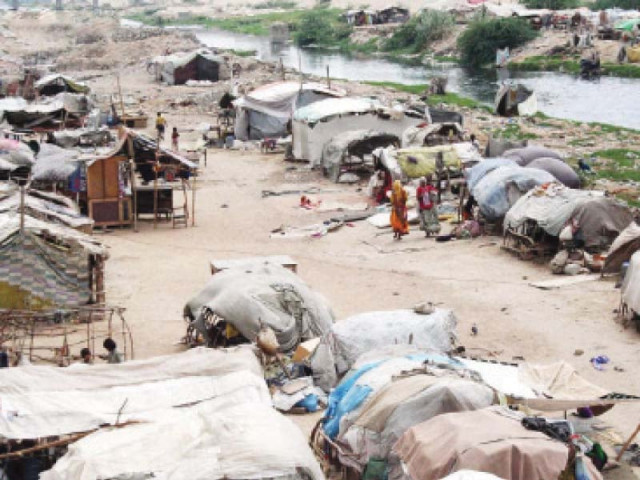Planning and rehabilitation: Karachi needs its katchi abadis, say speakers
Urban planning experts point out how every house in DHA has at least three servants belonging to these katchi abadis

A large number of people live in the slums situated near Lyari River. Speakers at an urban planning seminar said these slums are necessary as they house a majority of the city’s population. PHOTO: FILE
Will Karachi be able to survive if all the katchi abadis in the city, which are usually referred to as 'stains on its face', are removed?
This question was raised by NGO Saiban chairperson Tasneem Siddiqui at a seminar titled, 'Karachi: Planning and Rehabilitation for the City', at Szabist on Saturday. The seminar was chaired by local bodies minister Syed Nasir Hussain Shah.
Talking about the issues of housing shortage, katchi abadis and low-cost housing, Siddiqui said that every house in Defence Housing Authority (DHA) has at least three servants belonging to those katchi abadis, which are known as stains on the city's beauty. "The city's transport is being run by them," he said. "Zulfikar Ali Bhutto announced the regularisation of these settlements."
He lambasted the government for being adamant on removing all such settlements, in which around 55 per cent of the population lives in, from the city while providing no alternative housing schemes for the low-income class.
Talking about the early days of Karachi, he spoke of how well-planned the city was with housing for everyone. He reminisced about how the city used to be headed by an elected mayor. However, the system was abolished. "Now, the bureaucrats have taken over the city with no knowledge on how to manage it." According to him, planning failure is on the rise and urban sprawl is taking place after a change in administrative system.
Siddiqui said that Karachi was already the port city, which was later made into an industrial city. "The shift of population [from other smaller cities] to [the] industrial hub was natural in such a case," he pointed out. He further said that in order to build factories and infrastructure, labour was required, which came from smaller towns and needed a place to live in. "The government and the so-called entrepreneurship ignored their residence [issue]."
He also talked about the large number of empty plots and flats in the city, which are being used for business purposes. According to Siddiqui, people were not buying plots in Bahria Town for residential purpose - they will sell it later in four times higher the price. "This is not housing development but plot development. As a result of this, there are 200,000 vacant plots in the city and five million empty flats," he said, adding that this was the reason why the labour force lived in drainage lines, across the railway tracks and around industrial areas.
Urban Resource Centre chairperson Arif Hasan spoke about the city's expansion and its complications. He said that the nostalgia for 'old Karachi' has to end as it was part of the colonial culture. "Even in Bombay it ended and was replaced by [the culture introduced by] Bollywood," he said.
He gave four criteria that must be applied for judging projects as, according to him, planning has been replaced by projects in the city. Firstly, he said, projects should not damage the ecology of the region in which Karachi was located. Second, they must determine the land use on the basis of social and environmental consideration and not on land value alone. "Projects should serve the interests of the majority, which are low-income groups," he said. "And [they] should respect and enhance the tangible and intangible culture of the communities that live in Karachi."
He also asked the local bodies minister why only the Gujjar Nullah was being cleared of encroachments and why not Urdu Bazar, MPA Hostel and Defence Phase VII. He pointed out that in the outfall of Mehmoodabad Nullah, Defence Phase VII has been constructed. "I am not sure if the houses of Phase VII will ever be demolished," he said.
To this, Shah responded that only those areas of Gujjar Nullah were being cleared where, due to encroachment, it became impossible to clean the drains.
Published in The Express Tribune, August 23rd, 2015.


















COMMENTS
Comments are moderated and generally will be posted if they are on-topic and not abusive.
For more information, please see our Comments FAQ